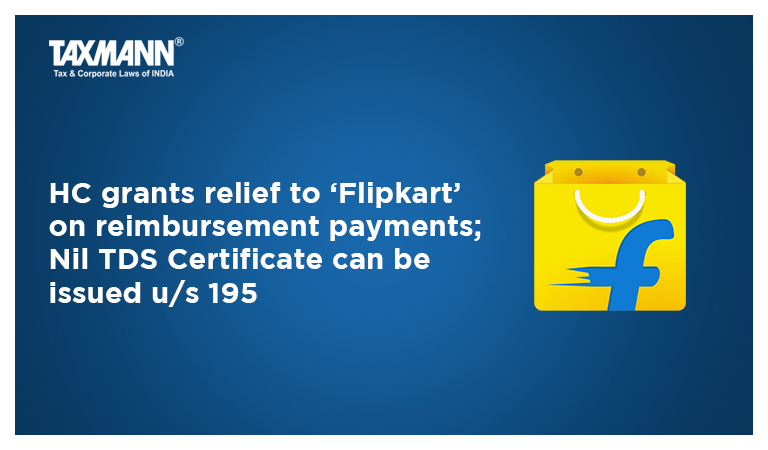HC grants relief to ‘Flipkart’ on reimbursement payments; Nil TDS Certificate can be issued u/s 195
- Blog|News|Income Tax|
- 2 Min Read
- By Taxmann
- |
- Last Updated on 1 July, 2022

Case Details: Flipkart Internet (P.) Ltd. v. DCIT - [2022] 139 taxmann.com 595 (Karnataka)
Judiciary and Counsel Details
-
- S. Sunil Dutt Yadav, J.
- Tarun Gulati, Sr. Adv., Kishore Kunal, Sri Parth, Ms. Ankita Prakash and Pradeep Mayank, Advs. for the Petitioner.
- K.V. Aravind, Adv. for the Respondent.
Facts of the Case
Assessee-Flipkart made payments in nature of “pure reimbursements” to Walmart Inc. for the Assessment Year 2020-21. In this regard, the assessee had filed application under section 195(2) before the Assessing Officer (AO) for issuance of a ‘Certificate of No Deduction of Tax at Source’.
However, the AO rejected the application on grounds that the same was not maintainable. AO held that Section 195(2) provides for the determination of an appropriate portion of the sum chargeable and does not contemplate ‘Nil deduction of tax at source’. Thus, recourse was to be made under Section 197.
The assessee filed the writ petition before Karnataka HC against the order passed by the AO rejecting the application for ‘Nil TDS Certificate’.
High Court Held
The Karnataka High Court held that as per Rule 29BA, an application can be made by the payer in Form No. 15E for grant of Certificate determining the appropriate proportion of sum chargeable to tax under Section 195(2).
As per Rule 28, a person can file an application in Form No. 13 for the grant of a certificate for deduction of tax at any lower rates or no deduction of tax under Section 197(1). Form No. 13 prescribes the format of the application that is to be made by the recipient/payee.
Thus, it is clear that Section 197 can be invoked by the recipient, and accordingly, the contention of AO that the application made under Section 195(2) wasn’t maintainable to be rejected.
Further, the object of Section 195(2) and Section 197 are in the nature of safeguards for the assessee. The provisions are to be invoked to avoid the consequences of a finding eventually that the payer ought to have made deduction after assessment and in such case, it would be open to treating the assessee as “an assessee in default” in terms of Section 201, leading to disallowance of expenses and prosecution.
Keeping in mind that the determination under Section 195(2) or under Section 197 by the grant of Certificate is tentative in nature, the assessee must be permitted to invoke such provision and seek the certificate to avoid consequences of non-deduction as enumerated above.
It cannot be said that the assessee is debarred from invoking the provision of section 195(2) if he was of the view that the payment was not chargeable to tax. To place such a heavy burden of adjudication upon the assessee before invoking the tentative determination under Section 195(2), may not be called for. Accordingly, the recourse to Section 195(2) is perfectly in consonance with the object of Section 195 and cannot be faulted.
As the rejection of section 195(2) application is based on an erroneous understanding of the legal position, the writ petition was to be allowed. AO was directed to issue a certificate under section 195(2) of nil deduction of TDS.
Disclaimer: The content/information published on the website is only for general information of the user and shall not be construed as legal advice. While the Taxmann has exercised reasonable efforts to ensure the veracity of information/content published, Taxmann shall be under no liability in any manner whatsoever for incorrect information, if any.

Taxmann Publications has a dedicated in-house Research & Editorial Team. This team consists of a team of Chartered Accountants, Company Secretaries, and Lawyers. This team works under the guidance and supervision of editor-in-chief Mr Rakesh Bhargava.
The Research and Editorial Team is responsible for developing reliable and accurate content for the readers. The team follows the six-sigma approach to achieve the benchmark of zero error in its publications and research platforms. The team ensures that the following publication guidelines are thoroughly followed while developing the content:
- The statutory material is obtained only from the authorized and reliable sources
- All the latest developments in the judicial and legislative fields are covered
- Prepare the analytical write-ups on current, controversial, and important issues to help the readers to understand the concept and its implications
- Every content published by Taxmann is complete, accurate and lucid
- All evidence-based statements are supported with proper reference to Section, Circular No., Notification No. or citations
- The golden rules of grammar, style and consistency are thoroughly followed
- Font and size that’s easy to read and remain consistent across all imprint and digital publications are applied



 CA | CS | CMA
CA | CS | CMA
